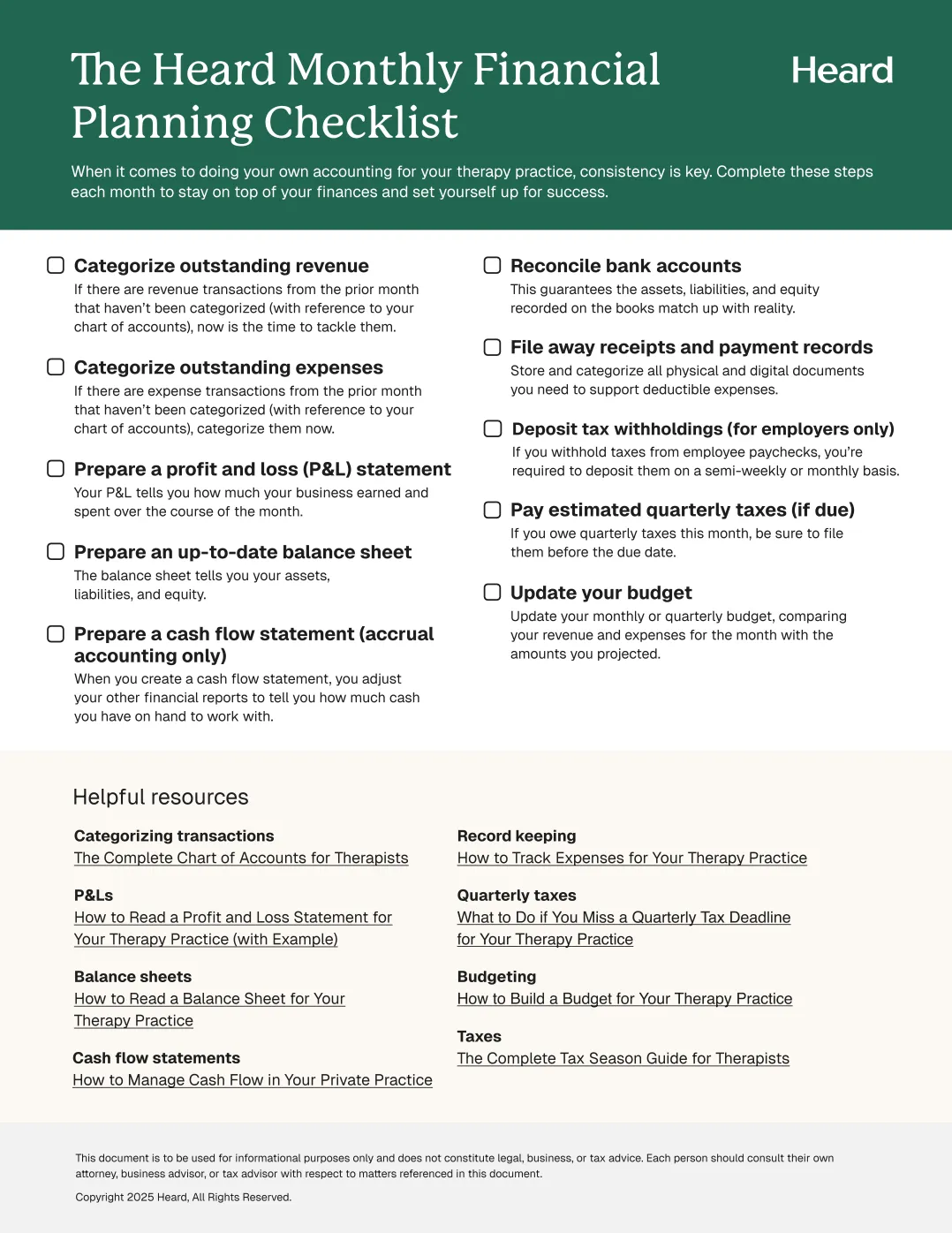When you run your own therapy practice, all it takes is a simple accounting mistake to land you in trouble.
That’s especially true when you’re new to running your own practice: All-too-common oversights, like failing to withhold income for taxes or neglecting financial reporting, can lead to issues with the IRS or your own cash flow (respectively).
Here are the nine most common accounting mistakes made by newly-employed therapists, and how you can avoid them.
{{resource}}
1. Mingling personal and business finances
When therapists make this mistake, it’s most commonly because they only have one checking account—a personal one—that they use for all their income and expenses.
Intermingling your personal finances and your therapy practice’s finances makes it difficult to get a clear read on how your business is performing.
For instance, suppose you pay your recurring business expenses (office utilities and rent, software subscriptions) using the same bank account you use for personal expenses (apartment rent, car payments, personal subscription services).
After you extract information from your bank account to calculate your therapy practice’s expenses—or when your accounting software does it automatically for you—you’ll need to go through and manually sort the professional from the personal expenses.
Not only does this eat up valuable time and energy, but it increases the likelihood you’ll miscategorize a personal expense as a business expense, or vice versa.
The simplest solution? Open a business checking account for your therapy practice.
2. Missing out on deductible expenses
If you do your own bookkeeping and accounting, there are a number of reasons you could fail to track and report deductible expenses:
- Lack of confidence: You’re unsure of what counts as deductible and what doesn’t. Erring on the side of caution, you fail to claim deductions your business is eligible for.
- Lack of awareness: You don’t track your expenses with software or a bookkeeping solution like Heard, so you don’t have insight into your expenses.
- Lack of planning: You don’t keep receipts or other records of your expenses, so you don’t feel confident deducting the expenses on your taxes. (That’s valid—you should keep records to back up every claim you make on your tax return.)
Deductible expenses aren’t some arcane tax trick—they’re a totally valid way to reduce your tax bill. When you claim a deductible expense, some or all of the value of the expense is subtracted from your gross income for the year, reducing the income you owe taxes on. For many companies, claiming expenses is an essential part of keeping their accounts in the black.
For more info, check out our complete list of tax deductions for therapists.
3. Failing to withhold income for taxes
If you’re used to being paid by an employer and having income tax automatically withheld from your paycheck, self-employment can come as something of a shock.
When you’re self-employed, it’s up to you to pay your income tax either in quarterly installments or after you file your taxes. In order to do so, you should plan to set aside 25 – 30% of everything you earn so you have the cash on hand to pay.
Many therapists in their first year of self-employment forget or neglect to set aside a portion of their income. They rarely make the mistake a second time: Trying to pay down your whole tax bill for the year without any savings in reserve can seriously sting.
For a deeper dive, check out our guide to quarterly taxes for therapists.
{{resource}}
4. Throwing out receipts
If you claim deductible expenses on your tax return, you must be able to back up your claim with a paper receipt or some other record proving you actually incurred the expense.
The IRS doesn’t want businesses claiming deductions on expenses they never actually paid. In the event of an audit, the auditors will demand to see a receipt supporting every expense you claimed. In some cases, they may go as far back as six years into your prior tax returns looking for supporting documentation.
Failing to keep receipts is common; being audited by the IRS is less so. But if you’re unlucky enough to be audited and you haven’t kept accurate records, you could end up owing the IRS a significant sum.
You can learn more from our article, Do Therapists Need to Keep Paper Receipts?
5. Forgetting about their budget
Roughly speaking, there are two parts to using a budget to plan your therapy practice’s finances.
The first part consists of projections—planning what you will need to spend to cover your expenses.
The second part is going back and reporting what you actually spent, not just what you expected to spend. It’s this stage that newly self-employed therapists often forget.
Keeping a record of the expenses you actually incurred versus what you expected to incur will help you, with practice, create more accurate budgets. It can also help you spot trends in spending that affect your practice’s cash flow.
To help plan and track expenses, try out our budget template for therapy practices.
6. Neglecting the benefits of a business credit card
If you’ve found it stressful in the past to manage your spending and pay down debt on a personal credit card, you may worry that getting a business card for your business could lead to more trouble.
That’s a valid point. But if you’re able to put in place strict rules for using and paying off your business credit card, and use it in an organized, intentional way, it can benefit your practice.
So long as you stay on top of payments, business credit cards offer:
- Perks in the form of point programs that can reduce business expenses
- Cashback for certain business expenses, including utilities bills and office supplies
- The chance to build credit for yourself and your therapy practice
Even if your business credit card of choice only gives you 2% cashback on your phone bill, the savings add up over time. And if you’re planning to travel for business in the future, accumulating points for airlines and hotels can make it more affordable.
Learn more about how to choose a credit card for your therapy practice.
{{resource}}
7. Not bothering to generate financial reports
Financial reports take information about how your practice spends and earns money and summarizes it in a format that helps you make business decisions.
If you use accounting software, it can generate reports for you—although you need to be sure entries in your general ledger are accurate for the reports to be accurate as well.
If you work with a bookkeeper or a service like Heard, you’ll not only get regular financial reports for your practice, but your general ledger is guaranteed to be accurate.
There are three main types of financial reports:
- The profit and loss statement (or the P&L) tells you how much money you’ve earned and how much you’ve spent during a particular reporting period (typically one month or one quarter).
- The balance sheet tells you your assets (how much you have) and your liabilities (how much you owe), up to a certain date
- The cash flow statement is only necessary if you use the accrual accounting method. It adjusts your P&L so you can see how much of what you earned over a particular period was cash and how much was credit.
Combined, these statements tell you how money is entering and leaving your business, and how much you have to work with. They’re essential for accurately filing your taxes.
Many newly self-employed therapists simply track their income and expenses on an ad hoc basis throughout the year, then bring the information to an accountant who compiles it all, creates a year-end P&L, and uses it to file their taxes.
Not only does this approach increase your accounting bill, it leaves you in the dark as to how your practice is performing. As a result, it’s hard to make important financial decisions like setting your fees, deciding how many clients to work on, and budgeting for expenses.
The sooner you set up a bookkeeping solution and start using financial statements, the sooner your practice benefits.
8. Failing to digitize and organize their records
Receipts for deductible expenses are one of the most important—and most common—financial records therapy practice owners need to keep.
Many receipts—such as those for utilities and subscriptions—arrive in digital format. Others—such as those for office supplies, or vehicle mileage when you travel for business—are paper.
Whatever format your receipts arrive in, it’s essential you keep digital copies and make sure they’re organized. Paper is a fragile medium. It’s easy to lose or damage. Digitized receipts, on the other hand, can be uploaded to the cloud or stored on external harddrives. That makes them both easy to protect from damage or loss, and easier to share with your bookkeeper or your team at Heard.
Tools like Expensify allow you to photograph your receipts and store them in the cloud. And Heard features an option to upload photographs of receipts to your account.
Other records best saved in a secure digital format:
- Past tax returns
- Invoices from contractors
- Financial reports
- Budgets
Try to keep these records organized with a filing system, not just dumped into a cloud folder or onto a thumb drive. You’ll thank yourself at tax time.
9. Doing it all on their own
There’s a good chance you became a therapist because you wanted to help people, not because you wanted to do your own bookkeeping and accounting.
Doing your own bookkeeping (tracking income and expenses) and accounting (generating financial statements and filing taxes) both eat up a significant amount of time. In fact, the less familiar you already are with standard bookkeeping and accounting practices—the steeper the learning curve you face—the more time you should expect to devote to them.
On top of that, the DIY approach can lead to serious errors filing and paying your taxes and tracking your practice’s performance. That applies even if you use accounting software.
The best way to ensure your bookkeeping and accounting are accurate, error-free, and handled in a timely fashion is to hire professional help. Learn more about what bookkeepers, accountants, and other financial professionals do, and how they can help your practice succeed.
–
When you use Heard, you avoid every mistake on this list. Here’s how Heard works.
This post is to be used for informational purposes only and does not constitute legal, business, or tax advice. Each person should consult their own attorney, business advisor, or tax advisor with respect to matters referenced in this post.
Bryce Warnes is a West Coast writer specializing in small business finances.
{{cta}}
Manage your bookkeeping, taxes, and payroll—all in one place.

Discover more. Get our newsletter.
Get free articles, guides, and tools developed by our experts to help you understand and manage your private practice finances.





